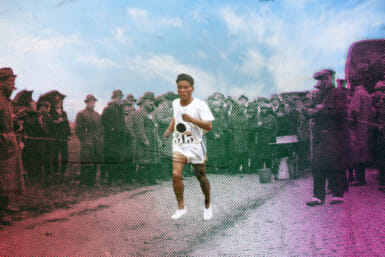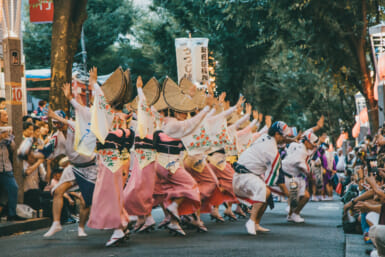by Jack Seward
It was shortly before Christmas when I arrived in Tokyo; strolled over to the Ginza to do Christmas shopping for friends at home, when I saw the mammoth banner outside a department store: ”Christmas Paint Your Harts!”
Other Westerners in the holiday crowds sighted the banner, too, for they slowed their pace and looked at it carefully with puzzlement written large on their features. I could almost hear them saying to each other, “Now what the devil do you suppose that means?”
I never learned the meaning, but the banner clung to my memory as the opening curtain of a long and memorable experience with Fractured English (sometimes called Translation Sensations) in Japan.
The many other examples encountered over the years were delightful, refreshing and often hilarious. They were instructive in that they showed us a people striving mightily to communicate with a horde of foreigners suddenly in their midst, efforts that even when laughable, at least deserved top grades for effort. (Few of us spent much time learning Japanese.) And with the passage of time we found that some of these instances of broken English had a piquant charm about them that somehow communicated the speaker’s meaning even better than standard correct English might have.
An example of this latter variety was a sign in front of the Nikko Botanical Gardens that read, “No Botanizing, drinking, or uproaring, etc. in the garden.” That left no doubt about what they meant . . . and made a lasting impression.
The language of signs (or “Sign Langwich,” as one Japanese sign-painter advertised his product) offered a most fruitful field, which we often harvested, with little gems like these:
• ‘Fondle dogs” (from a pet shop in Osaka)
• “We wash you” (from car-wash in Kawasaki)
• “Guaranteed Pure Gold Fish” (from a goldfish peddler’s cart)
• “Specialist for the Decease of Children” (from an Osaka pediatrician’s office)
• “Extract of fowl” (from an egg store)
One sign at the airport in Haneda seemed to predict uncannily the future of airline baggage services all over the world: “We Take Your Bags and Send Them in All Directions.”
Hotels were also good hunting grounds for the happy Fractured English hunter:
• “Use this elevator. Fright Elevator in repair.” (in the Shiba Hotel in Tokyo)
• The elevator is fixed for the next day. During that time we regret you will be unbearable.” (in a Niigata hotel)
• “Our hotel serves ten in a bag — like Mother.” (in a hotel near the docks in Kobe)
• “Rooms are changing their boys and girls.” (notice left in each room in an engineers’ billet in Yokohama, presumably by the room-boy)
• “Room-boy is a present.” (from a card attached lo a small gift left in the author’s room by the room-boy in Tokyo’s Dai Ichi Hotel.)
Although we never found proof of our suspicions, we used to like to imagine darkly that somewhere down in the dim, dank cellars under the national police forces headquarters in Tokyo, there dwelt a musty gnome of a man with tousled hair and a fanatic glint in his eye.
Ensconced among his trusty lexicons, he was charged with the English translation of all the traffic signs that were to be erected along the roads and streets of his country. It was his little empire (“Mine! All Mine!”) and his translations were never to be questioned. His word was god-like and final, and he never deigned to check his translation with native speakers of English for accuracy. Among his masterpieces were:
• “Cars will not have intercourse on this bridge.” (from a bridge near Fukuoka)
• “Let’s Reduce Noise by Ourselves.” (In one particular year, there were hundreds of these signs erected all along the byways of Japan.)
• “Vertical parking only.” (a sign on the street in front of the old Teito Hotel in Tokyo)
• “Quietly!” (This sign was also erected by the hundreds or even thousands throughout the country. The Japanese equivalent was “Shizuka ni,” which can, of course, be rendered as “Quietly!” but which in this instance carries with it the strong connotation of “Be calm, slow down, take care.”)
• “Have many accidents here!” (a sign at the Roppongi intersection in Tokyo)
The last of the above nearly caused an international incident when I first sighted it. It must have been the devil that made me do it, but I reported to a nearby police station and explained that, being a law-abiding sort of fellow, I insisted on obeying traffic signs to the precise letter and therefore wanted to know just where I should have the accidents and how many persons I should arrange to have injured in them. A surly lot, the Roppongi police could see little if any humor in this and made unwarranted threats.
Akin to this traffic-sign gnome in the police cellars, there was also, I was confident, an absolute linguistic genius squirreled away backstage in that marvelous hall of pleasure, the Nichigeki Theater. He was the man who, for many years, made up the titles (all in flawless English) for the song and dance productions shown in the Nichigeki Music Hall on the fourth floor.
It greatly behooves some ardent young researcher to go through the Nichigeki ads in the old newspaper files and record for future enlightenment the magnificent titles that this genius confected. We remember only three, but they were Jim Dandies:
• “Titillate Me Purple in the Tulip Time”
• “Shag and Shimmy at the Shine-town Shindig”
• “Three Dervishes at a Whippenpoof Whingding”
Just across the alley from the Nichigeki stood the Asahi Bldg., where labored the editors of The Asahi Evening News. One of these fellows concocted the idea of a contest in which this English-language newspaper would offer ¥1,000 for examples of weird Japanized English.
This contest produced some good ones, including, we recall, “A photograph of a medicine bottle, the label of which read: “Adults: Take three tablets a day until passing away.” But finally the great, grey eminence of the Asahi got caught in its own toils the day they ran this headline: “Solution to Laotian Crisis Remains Unsolved.”
Lest we be accused of poking fun only at the Japanese, we hasten to point out that during those same years we Westerners in Japan must have been—despite our lower level of linguistic activity— guilty of monumental bloopers that had even the normally restrained and polite Japanese rolling in the aisles.
Sadly, one has to understand Japanese to appreciate these offenses against proper language, but we may give a hint of their magnitude by pointing out two words similar in sound but quite different in meaning: Komon means adviser, but kōmon means anal exit, the only difference being the long or short sound of the first “o” in the words. I once had an American acquaintance who once introduced himself at a conference of Japanese businessmen with the Japanese equivalent of the sentence: “I am Mr. Sasakawa’s adviser.”
At least, that is what he intended to say—but he inadvertently used the long “o” instead of the short “o.” He broke up the conference.
In a proud window sign, a department store in Niigata had this to say about one of its items of merchandise: “Our nylons cost more than common but will find best for long run.”
In general, not only department stores but also tailors, dressmakers, and fashion stores were quite magnanimous with their Fractured English creations:
• “New and Old Clothes Fix Civilized Style.” (from a Nihombashi tailor shop)
• “We Make Fur Out of Your Skin.” (from a fashionable fur shop on the Namiki-dori in Tokyo)
• “Stateside Stile” (from an Ueno dressmaker’s store)
• “Ladies Have Fits Upstairs.” (that old classic from a dressmaker’s establishment near the Daibutsu statue in Kamakura)
• “Dresses for Ladies and Gentlemen” (chiselled in the marble facade above a Ginza clothing store)
• “European Monkey Jacket Make for Japanese” (example quoted in a book by B.H. Chamberlain)
Many jewels were mined in bars (where we found “Old American Whiskey—Established 1492” and “Old Airship Whisky—Since Early 1800s”) and in restaurants’ menus, such as:
- “Sardine Sand”
- “Cuban Livers”
- “Beef Strong Nuff”
- “Humbug Steak”
- “Rogue Fart Cheese”
- “Prown and Poison Au Gratin”
One Shinjuku bar yielded, in its toilet, the carefully-lettered sign: “To stop drip, turn cock to right.”
The famous Deer Park in Nara warned its visitors to “Beware of Bucks with Long Horns.” (Take your time, ladies. Don’t push. The train for Nara doesn’t leave for another hour.) On the window of a photographer’s studio was painted “Photographer Executed,” and in the same neighborhood stood a sundries store with the sign. “Sun Light Soap —Lever Brothels, Ltd.”
For a while we puzzled over an English-language map of Tokyo, showing a location near Tokyo Bay with the description, “Dirty Water Punishment Place.” Checking the original Japanese, we learned that it was a Sewage Disposal Plant, but the linguistic complications leading from there to “Dirty Water Punishment Place” are too lengthy and tortuous to set down here.
Another puzzling sign was found in a suburban Tokyo shop window, with no other indication as to the nature of the store or what product or service it wanted to sell. We never did enter to find out; I think we were uneasy about what we might be told. The sign, in its entirety, read: “Come in and have your thing engraved.”
In Things Japanese B.H. Chamberlain mentioned a booklet distributed to Japanese policemen entitled, “The Practical Use of (English) Conversation for Police Authorities,” which is divided into such chapters as “Cordinal Number,” “Official Tittle,” and “Ports of the Body.”
Under “Misseranious Subjects” is offered an imagined conversation between a Japanese policeman and a British sailor:
Policeman: “What countryman are you?”
Sailor: “I am sailor belonged to the Golden Eagle, the British man-of-war.”
Policeman: “Why do you strike this jinrikisha man?”
Sailor: “He told me impolitely.”
Policeman: “What does he told you impolitely?”
Sailor: “He insulted me saing loudly ‘the Sailor, the Sailor’ when I am passing here.”
Policeman: “Do you striking this man for that?”
Sailor: “Yes.”
Policeman: “But do not strike him for it is forbidded.”
Sailor: “I strike him no more.”
Toward the end of this booklet, the author himself appears to have his own private doubts about what he has wrought, for he injects a conversation between two policemen that ends on this note:
First policeman: “You speak English very well.”
Second policeman: “You jest.”
Quite possibly the one classic instance of Fractured English in Japan that must tower head, shoulders and torso over all competition was seen when Douglas MacArthur was still enthroned in Tokyo and was being promoted as a possible candidate in the pending U.S. presidential election. A group of ardent Japanese supporters of the already aging general arranged to have a gigantic banner hoisted high over the busy Hibiya intersection in downtown Tokyo, just where MacArthur could see it when he emerged from his office in the Dai Ichi Building.
Bearing in mind that the Japanese tend to confuse the “r” and the “l” in English, try to visualize these six-foot high letters that were emblazoned on the banner:
“WE PRAY FOR MAC-ARTHUR’S ERECTION!”
Well, we pray Christmas will paint your harts, too.








